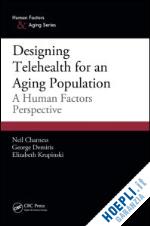Neil Charness is William G. Chase Professor of Psychology and an Associate of the Pepper Institute on Aging and Public Policy at Florida State University. He received his B.A. from McGill University, and M.S. and Ph.D. from Carnegie Mellon University. Prior to coming to Florida, he was on the faculty at Wilfrid Laurier University and the University of Waterloo in Canada. Neil’s research focuses on human factors approaches to aging and technology use, older driver and pedestrian safety, and age and expert performance. Neil is a fellow of Association of Psychological Science, American Psychological Association (APA), Canadian Psychological Association (CPA), the Gerontological Society of America, and an honorary member of the International Society for Gerontechnology. He is a past editor of the Psychology section of the Canadian Journal on Aging/Revue Canadienne du Vieillissement, and a past president of Adult Development and Aging Divisions of APA and CPA. He is currently chair of the Human Factors Special Interest Group of the American Telemedicine Association. Dr. Krupinski is a Professor at the University of Arizona in the Departments of Radiology, Psychology and Public Health, and she is Vice Chair of Research in Radiology. She received her undergraduate degree from Cornell University, MA from Montclair State College and PhD from Temple University, all in Experimental Psychology. Her main interests are in medical image perception, assessment of observer performance, medical decision making, and human factors. She is Associate Director of Evaluation for the Arizona Telemedicine Program. She has published extensively in these areas, and has presented at conferences nationally and internationally. She serves on the Editorial Boards of a number of journals in both radiology and telemedicine, and on review panels for NIH, DoD, FDA and TATRC. She is Past Chair of the SPIE Medical Imaging Conference, Past President of the American Telemedicine Association, and Chair of the Society for Imaging Informatics in Medicine. George Demiris is an Associate Professor of Biobehavioral Nursing and Health Systems at the School of Nursing and Biomedical and Health Informatics, at the School of Medicine, University of Washington. He is the Graduate Program Director of Biomedical and Health Informatics at the School of Medicine and the Director of the Clinical Informatics and Patient Centered Technologies at the School of Nursing. He obtained his MSc degree in Medical Informatics from the University of Heidelberg, Germany and his PhD degree in Health Informatics from the University of Minnesota. His research interests include the design and evaluation of home based technologies for older adults and patients with chronic conditions and disabilities, smart homes and ambient assisted living applications and the use of telehealth in home care and hospice. He is the Chair of the International Medical Informatics Association (IMIA) Working Group on Smart Homes and Ambient Assisted Living, the Past Chair of the Human Factors Special Interest Group of the American Telemedicine Association (ATA) and the Lead Convener of the Technology and Aging Special Interest Group of the Gerontological Society of America (GSA).











